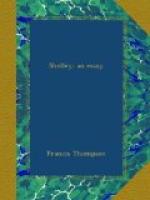In truth, his very unhappiness and discontent with life, in so far as it was not the inevitable penalty of the ethical anarch, can only be ascribed to this same child-like irrationality—though in such a form it is irrationality hardly peculiar to Shelley. Pity, if you will, his spiritual ruins and the neglected early training which was largely their cause; but the pity due to his outward circumstances has been strangely exaggerated. The obloquy from which he suffered he deliberately and wantonly courted. For the rest, his lot was one that many a young poet might envy. He had faithful friends, a faithful wife, an income small but assured. Poverty never dictated to his pen; the designs on his bright imagination were never etched by the sharp fumes of necessity.
If, as has chanced to others—as chanced, for example, to Mangan—outcast from home, health and hope, with a charred past and a bleared future, an anchorite without detachment and self-cloistered without self-sufficingness, deposed from a world which he had not abdicated, pierced with thorns which formed no crown, a poet hopeless of the bays and a martyr hopeless of the palm, a land cursed against the dews of love, an exile banned and proscribed even from the innocent arms of childhood—he were burning helpless at the stake of his unquenchable heart, then he might have been inconsolable, then might he have cast the gorge at life, then have cowered in the darkening chamber of his being, tapestried with mouldering hopes, and hearkened to the winds that swept across the illimitable wastes of death. But no such hapless lot was Shelley’s as that of his own contemporaries—Keats, half chewed in the jaws of London and spit dying on to Italy; de Quincey, who, if he escaped, escaped rent and maimed from those cruel jaws; Coleridge, whom they dully mumbled for the major portion of his life. Shelley had competence, poetry, love; yet he wailed that he could lie down like a tired child and weep away his life of care. Is it ever so with you, sad brother; is it ever so with me? and is there no drinking of pearls except they be dissolved in biting tears? “Which of us has his desire, or having it is satisfied?”




